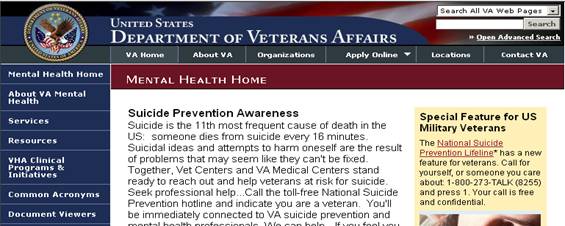|
|
 |
What to expect when you call - Click
play
to hear the 1-800-273-TALK greeting with the option to press one if you are a U.S. military veteran.
|
|
|
|
Veterans Mental Health
|
Veterans and Suicide
Veterans Health Administration (VHA)
My Healthe Vet
PTSD
Depression
Veteran Women
Veterans and Suicide

Veteran specific factors that may increase risk
- Frequent deployments
- Deployments to hostile environments
- Exposure to extreme stress
- Physical/sexual assault while in the service (not limited to women)
- Length of deployments
- Service related injury
Suicide Warning Signs
Veterans Health Administration (VHA) - Mental Health Home

The Veterans Health Administration (VHA)
Mental Health Strategic Healthcare Group provides general inpatient psychiatric services as well as mental
health outpatient services in medical centers and community-based outpatient clinics. In addition, readjustment
counseling services are available for veterans and their families at vet centers across the nation. Please
visit the Resource Locator
to find a vet center, medical center or outpatient clinic nearest you.
VHA Links:
Veterans Mental Health Home
My Healthe Vet

My HealtheVet
(MHV) is the gateway to veteran health benefits and services. It provides access to:
- Trusted health information
- Links to Federal and VA benefits and resources
- The Personal Health Journal
- Online VA prescription refill
PTSD

Posttraumatic Stress Disorder (PTSD) is an anxiety disorder that can occur after you have been through a
traumatic event. A traumatic event is something horrible and scary that you see or that happens to you. During
this type of event, you think that your life or others' lives are in danger. You may feel afraid or feel that
you have no control over what is happening.
Anyone who has gone through a life-threatening event can develop PTSD. These events can include:
- Combat or military exposure
- Child sexual or physical abuse
- Terrorist attacks
- Sexual or physical assault
- Serious accidents, such as a car wreck.
- Natural disasters, such as a fire, tornado, hurricane, flood, or earthquake.
After the event, you may feel scared, confused, or angry. If these feelings don't go away or they get worse,
you may have PTSD. These symptoms may disrupt your life, making it hard to continue with your daily activities.
PTSD and Veterans: The newest patients to the VA have been returning combat soldiers, men and women who served
in Operations Enduring Freedom and Iraqi Freedom. (OEF/OIF). In a recent study, Dr. Karen Seal and colleagues
at the San Francisco Veterans Affairs Medical Center and USC, reviewed records for over 100,000 veterans,
who separated from active duty between 2001-2005 and sought care from VA medical facilities.
The most common combination of diagnoses found was post traumatic stress disorder (PTSD) and depression. Young
soldiers were three times as likely as those over 40 to be diagnosed with PTSD and/or another mental health
disorder. Most mental health problems were first identified during visits with primary care doctors, not with
mental health professionals.
Getting help early can prevent PTSD and other problems from becoming chronic. VA is expanding counseling and mental
health services to meet the needs of the returning veterans and provide early treatment. For more information on PTSD
and its treatment, please visit the National Center for PTSD.
PTSD Links:
National Center for PTSD
PTSD Frequently Asked Questions
Depression

Depression is an illness that causes a person to feel sad and hopeless much of the time. It is different from
normal feelings of sadness, grief, or low energy.
Anyone can have depression. It often runs in families. But it can also happen to someone who doesn't have a family
history of depression. You can have depression one time or many times.
If you think you may be depressed, tell your doctor. There are good treatments that can help you enjoy life again. The
sooner you get treatment, the sooner you will feel better.
For more information about depression, see these links:
Depression Links:
Veterans Mental Health Home
Veteran Women

The VA is committed to assisting women veterans with a wide range of mental health and psychosocial services.
Veteran Women Links:
Center for Women Veterans
Sexual Trauma Counseling
Women Strategic Health Group
Women Veterans Heath FAQ
|
|
|
|
|
|